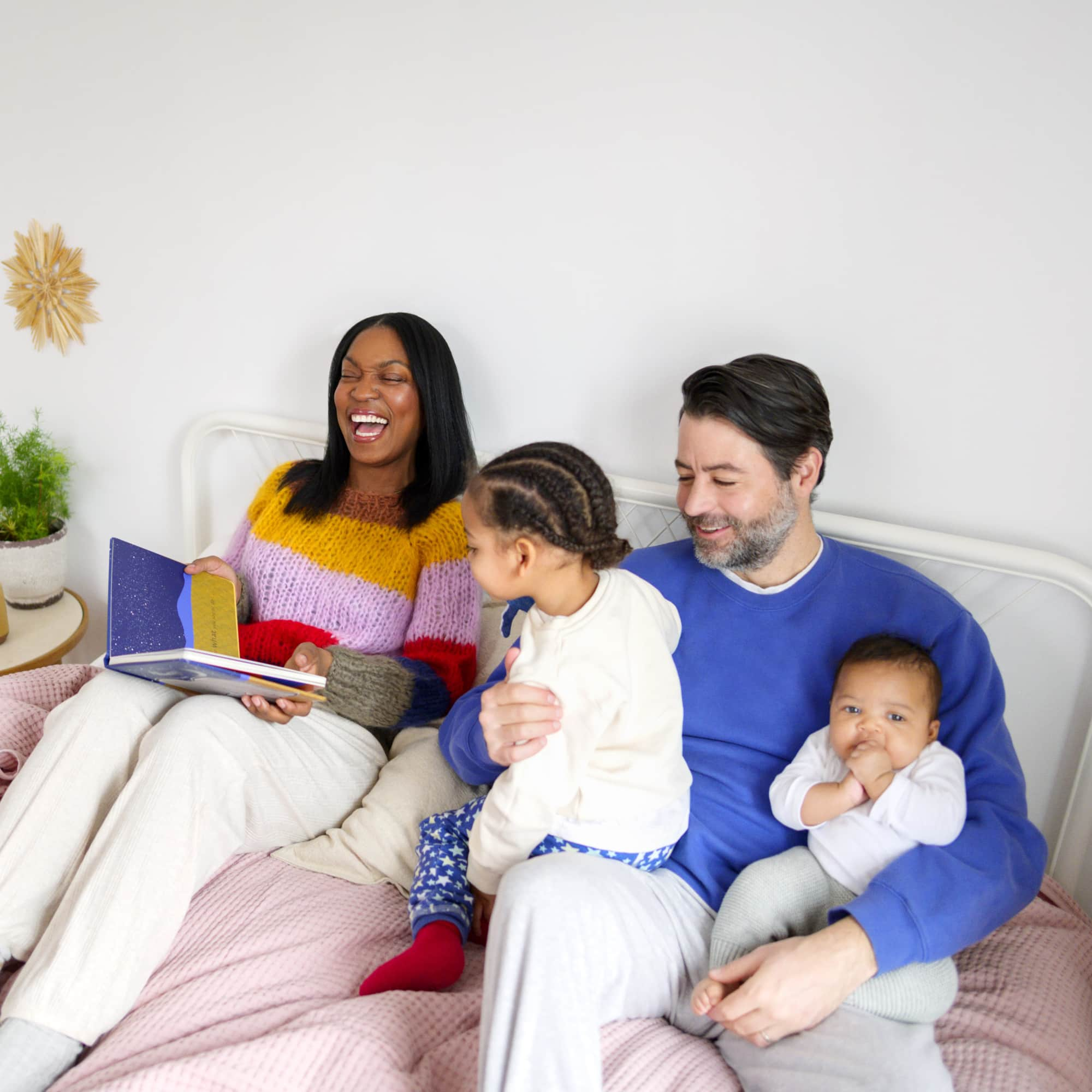
- POPSUGAR Australia
- Family
- This Year, I Want to Be a Happier Parent, Not Necessarily a “Better” One
This Year, I Want to Be a Happier Parent, Not Necessarily a “Better” One

So often, a new year rolls around, and we parents vow to be better. This is the year we’ll finally give our kids the parents they deserve! You know, the one who isn’t distracted by her phone, who only serves nutritious snacks, who doesn’t lose her patience or raise her voice, who buys expensive memberships to museums, and enrolls them in all the most highly reviewed activities to foster their intellectual development.
I’ve spent a few years trying to be this “better” parent only to beat myself up for not hitting my self-imposed benchmarks of success. It wasn’t that I was a bad mom. On the contrary, I was a good mum – with kids who are safe, healthy, fed, and loved – but because I wasn’t perfect, I’d failed. There’s always next year, right?
Well, this go-around, I’m calling bullsh*t. It’s not enough to “be better.” It’s not enough to dog-ear every book about positive parenting philosophies and test-drive every kid-friendly veggie-packed lunchbox recipe. It’s not enough to delete all the social media apps on our iPhones and practice mindful breathing techniques when our toddlers act out. It’s never enough.
Instead of setting myself up to lose a race that doesn’t quite exist, I’m determined to focus less on what I can do to be better and more on what I should do to be happier.
Because, really, isn’t a happier parent a better one anyway?
Praise My Kids Every Day
I love my kids, and like most parents, I think they are generally the greatest humans who ever existed. But, somehow I noticed that although I “think” one thing, I more often say another. From playgroups to group texts, I often find myself complaining and commiserating more than commending. This year, I’m going to make a point to verbalize the positive experiences as well as the frustrating moments. Sure, there’s comfort in the self-deprecating banter that comes with trying to outdo your mom friends on who suffered through the worst public tantrum that week, but it’s also good for my soul to share the great stuff, too.
Put Myself First
When I first had kids, I put myself last. As they exited the baby phase, I noticed my ranking rise back up again, but putting myself at the tip-top of the list was still a rarity. And although I know I won’t be able to put my needs above all others every time, I’m certainly going to try to do so regularly and without a hint of guilt that I’m being selfish. In fact, I’m hopeful that once a week, I’ll choose me over my family, whether that’s getting drinks with friends over dinner at home, going to the gym instead of a six-year-old birthday party, or running errands and then stopping to get a glass of wine and scroll through my Instagram feed instead of rushing back to the grind.
Stop Keeping Score
One of my most egregious offenses as a parent? My mental scorecard. Of course, there’s the record-keeping I do between me and my husband – Who did more today? – but it wasn’t until I stopped to think about how much time I spend pitting our parental workload against each other that I realised how many other tallies I keep. I’ve subconsciously tracked how I measure up compared to my mom friends, the parents in my kid’s classroom, my working-mum colleagues, and the influencers I follow on social media. It’s a hard habit to break, but I’m going to try.
Accept that My Kids Will Never Be “Equal”
My parents worked hard to ensure that any opportunities they gave my older brother, they also gave me. I’m sure if my dad found a dime on the ground and gave it to my sibling, he’d make a mental note to give me the next piece of loose change he came across. This egalitarian principle has stuck with me into parenthood, and although I do generally want both my girls to be treated fairly (I don’t dare entertain the idea of favorites), I’ve discovered that keeping things squarely down the middle is an impossible goal to achieve. I killed myself this past year trying to arrange a schedule that had my youngest involved in the same activities my oldest was at the same age, even though it patently made our daily lives more complicated. And more recently, I was wracked with guilt over the decision to send my youngest to full-day preschool a year earlier than we did with my oldest due to changing childcare options and a shrinking budget. Once I made the obvious realization that my kids weren’t angrily tallying up the toddler music classes they didn’t get to attend, it was clear: stressing over making things equal isn’t worth the stress.
Refrain From Planning Too Far Out
This past year, my husband and I struggled to stay on top of the most basic of things. Either we weren’t planning our lives at all – most mornings were a rush of scrounging around the pantry for scraps that could be cobbled together for a meal while arguing over who had volunteered to take the kids to the dentist – or we were getting overwhelmed trying to foresee what our schedules would look like a month out. For us, we’ve learned that looking five days ahead is our sweet spot. So, we got a whiteboard affixed to our fridge that has a rundown of dinner plans for that workweek along with any important reminders, like doctor appointments. Even though I tend to like long-term planning, I’m committing to living in the week ahead.
Opt Out
Some nights, I’m in a foul mood and being tasked with putting two rambunctious kids to bed is only going to make matters worse. So, instead of trying to power through on those nights (or, conversely, on those mornings getting ready for school) only to inevitably lose my temper, I’m simply telling my partner that, for everyone’s benefit, I am not going to participate this time. Sure, it might be annoying for him to have to go it alone, but it’s not permanent, and he can certainly take the same liberty another night. I’m not winning any prizes for “most consecutive nights physically restricting children to their beds until they lose consciousness,” nor should I want to.
Abandon One-Size-Fits-All Rules
So many conflicts at home are because I’m trying to enforce a rule that makes sense for one kid but not another. For example, I’d tried to impose a “no getting up from the table while everyone is still eating” policy only to discover that it helped one kiddo focus on her meal but was excruciating for my high-energy toddler who doesn’t have much of an appetite in the evenings, anyway. I’ve already seen that responding differently has helped, and after some tension (“It’s not fair that she gets to . . .”), we’re all happier with a more needs-based approach to rules and consequences.
Drop "Mom Guilt" and "Mom Brain" From My Vocabulary
I’m so tired of blaming my “mommy brain” for forgetting to sign up for the next round of gymnastics classes, and I’m sick of saying that my “working mom guilt” is forcing me to chaperone my kid’s field trip. As much as I’d like to say I’m committed to feeling less guilty, however, I know that it’ll take a healthy mix of medication and talk therapy to do that. So instead, I’m going to stop blaming things like forgetfulness and culpability with being a mother. Last I checked, when my husband forgot to pick up toilet paper, he simply forgot to pick up toilet paper – he didn’t suffer from a traumatic dad brain injury.
Take "Divide and Conquer" to the Next Level
You may have heard of “divide and conquer” as a parenting dynamic. I’ve employed it ever since our second kid was born. With our first baby, my husband and I did everything together as a unit. Doctor appointments, swim classes, walks to the park – you name it, the three of us were there. But once we had two kids, we realized how much more we could get done if we divvied up. One parent could get groceries with the baby in tow while the other took the toddler to a playdate. So efficient! But, a few years into that dynamic, I’m realizing a third, far better option: all or no one. Sometimes, it’s impossible for me or my husband to ever recharge when we are constantly liable for another human, so we are more frequently opting to take one for the team to give the other an actual full-on break. My husband will brave the grocery store with both kids while I get a manicure, and I’ll take the kids to the park and for lunch while he takes a three-hour nap. It can be exhausting when you’re “on call” but, oh, does it make up for it when you’re not.










